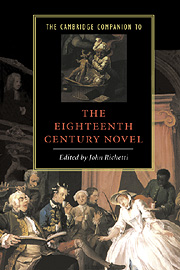Book contents
- Frontmatter
- 1 Introduction
- 2 The novel and social/cultural history
- 3 Defoe as an innovator of fictional form
- 4 Gulliver's Travels and the contracts of fiction
- 5 Samuel Richardson
- 6 Henry Fielding
- 7 Sterne and irregular oratory
- 8 Smollett's Humphry Clinker
- 9 Marginality in Frances Burney's novels
- 10 Women writers and the eighteenth-century novel
- 11 Sentimental novels
- 12 Enlightenment, popular culture, and Gothic fiction
- Index
3 - Defoe as an innovator of fictional form
Published online by Cambridge University Press: 28 May 2006
- Frontmatter
- 1 Introduction
- 2 The novel and social/cultural history
- 3 Defoe as an innovator of fictional form
- 4 Gulliver's Travels and the contracts of fiction
- 5 Samuel Richardson
- 6 Henry Fielding
- 7 Sterne and irregular oratory
- 8 Smollett's Humphry Clinker
- 9 Marginality in Frances Burney's novels
- 10 Women writers and the eighteenth-century novel
- 11 Sentimental novels
- 12 Enlightenment, popular culture, and Gothic fiction
- Index
Summary
That the novel began in either 1719 with Daniel Defoe's Robinson Crusoe or in 1740 with Samuel Richardson's Pamela is a commonplace familiar to all students of English literature. Both assertions are based upon the notion that an entirely new literary form emerged in the first half of Britain's eighteenth century, for no one familiar with early fiction would deny that an extensive body of prose fiction existed before either of these two dates. Without attempting to show that the so-called “Greek romances” of antiquity contained almost all the possibilities that the eighteenth-century novelists were to explore, as a recent critic has maintained,' I find it difficult to disqualify Cervantes's Don Quixote, some of the many picaresque fictions of the sixteenth and seventeenth centuries, and many of the extremely popular “novels” (a work of prose fiction often as long as a modern novel and frequently about contemporary life) written mainly in France and Spain during the latter century merely because they were not written in English.
- Type
- Chapter
- Information
- The Cambridge Companion to the Eighteenth-Century Novel , pp. 41 - 71Publisher: Cambridge University PressPrint publication year: 1996
- 3
- Cited by

